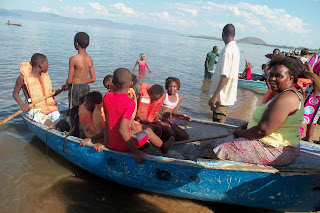For most of us, “On Call” conjures up images of medical personnel ready and waiting to leap into action at the alarm of an emergency to save lives. But here in Malawi, I’ve learned a different understanding for “On Call.” This application involves spiritual lives, but not necessarily in an emergency. It is that every pastor is expected to be able to lead worship or to give inspiration whenever called upon. I found myself On Call a number of times this week.
Twice it happened at morning devotions. The Synod has “prayers” every week day morning at 7:30. This is a time for the entire staff to gather together for singing, a short meditation on a passage of scripture and a prayer for the day’s activities. The passage of scripture and the one to deliver the meditation are assigned at the beginning of the month. There is a rotation, so that in the course of the year everyone on staff, from the General Secretary to the grounds workers, has several turns, usually about once every 6 weeks. A reminder is given the day before, just in case one forgets it is his day to lead worship. But if the one to lead does not come for some reason, then one of the clergy who is at prayers is “On Call” to step in and lead, preferably on the assigned passage of scripture. Monday when I went to prayers, the speaker did not come. There were only two clergy there and my colleague pushed that I should preach, if he would select the hymns and lead the prayer. I agreed. Thursday, the same thing happened, except I was the only clergy present so the staff just assumed that I would give the meditation. Since this is Advent, the passages are fairly familiar, so this is not a great stretch. In the States, many pastors would be unnerved to be called on to preach, with no preparation. It violates what we are taught about rightly handling the Word of God. But this is Malawi. More than once, I have gone to a large worship service and been told as I walk into the vestry that I will be the preacher for the service. It pays to always have as sermon” in your pocket,” just in case. You could be called on at any time – On Call.
(Just as an aside, the issue of attendance has to do with the fuel shortage. Because fuel is hard to come by, there are fewer mini buses running and it is harder to get a ride to get to work in time for prayers. Usually it is not an issue, since this is Malawi and time is not as strictly kept as in the northern hemisphere, except when it is your turn to lead prayers.)
On Wednesday evening, one of the Limbe prayer cottages, a small group within the congregation, came to visit the manse. This is time for them to bring food for the pastor’s pantry for the month. Usually the group has prepared a short worship service and one of the members of the group gives a short meditation for the gathering, to feed spirit as well as body. But this evening was different. The leader of the group said that they usually have a Bible Study on Wednesdays, but since they were coming to my house they had not prepared one. They hoped I would lead them in a Bible Study. I found myself “On Call.” This is one of those times that I praise God that he has directed me in doing personal Bible Study each day. I have something to fall back on when I am “On Call” like that.
This context gives a whole new meaning to Peter’s instructions in 1 Peter 3:15 to “Always be prepared to give an answer to everyone who asks you to give the reason for the hope that you have.” The truth is, the pastor is always On Call.





















